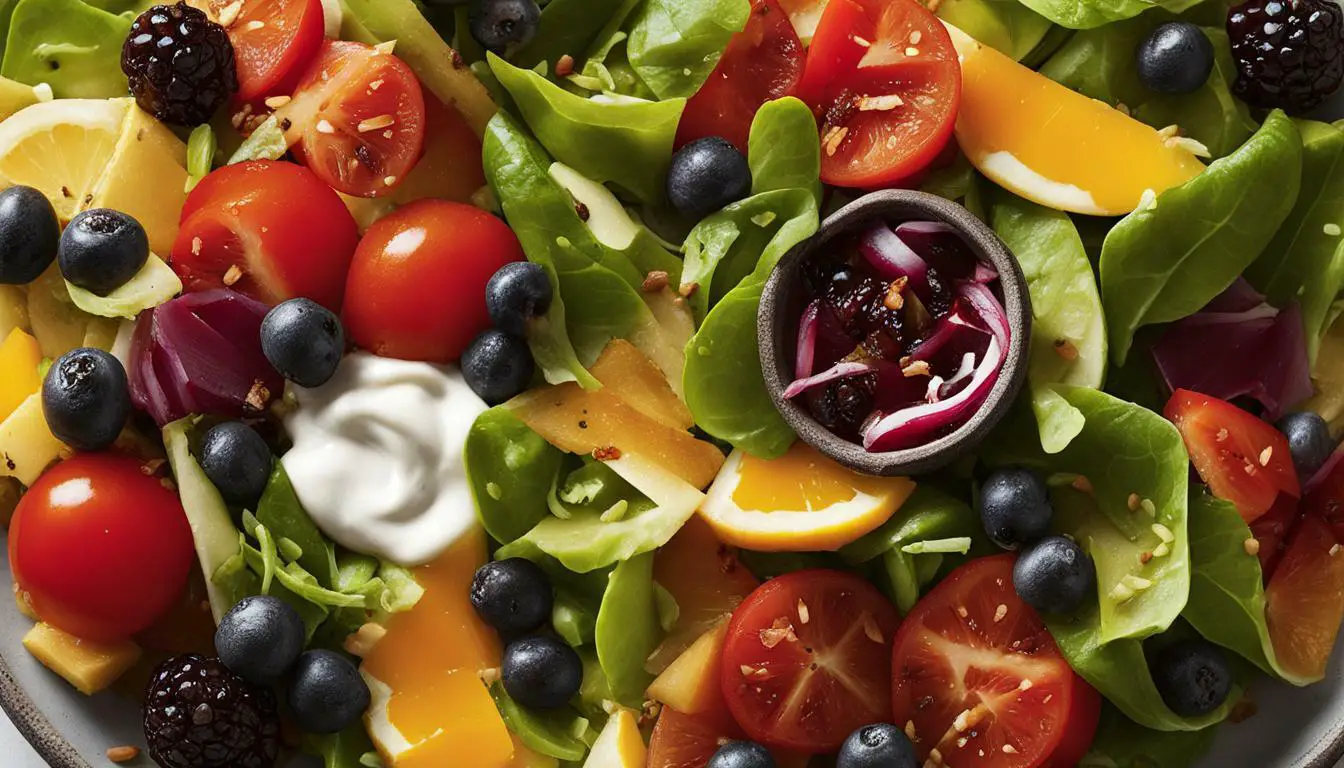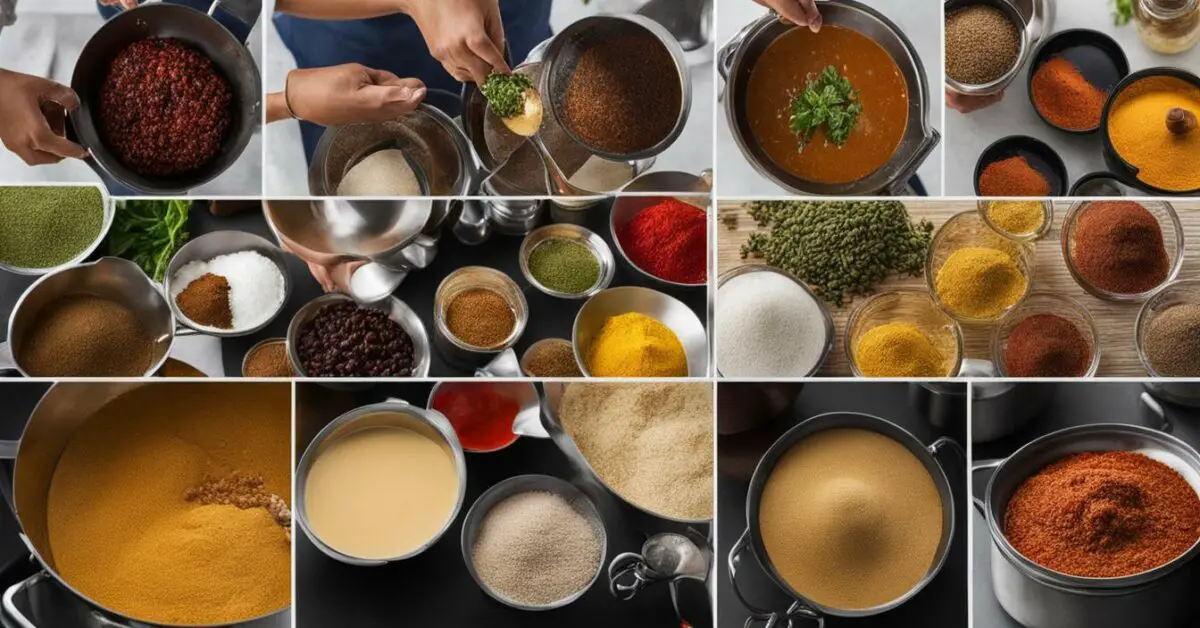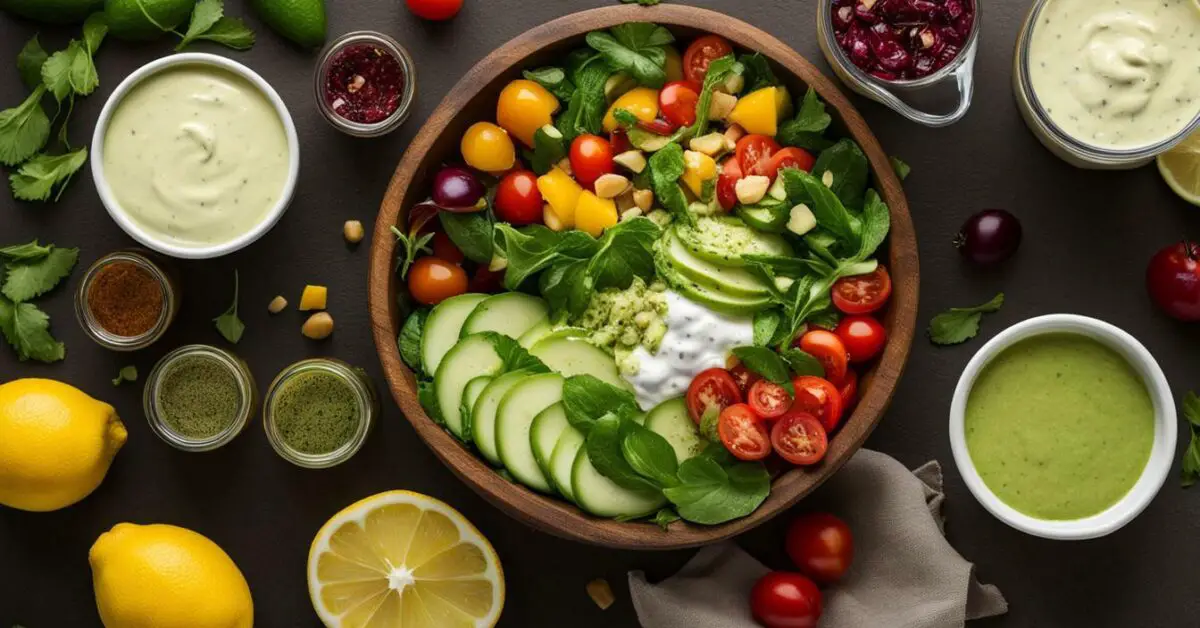
This post may contain affiliate links. Please read my disclosure for more information.
Are you looking for substitutes for vinegar in a dressing? Here are 5 ideal options to consider.
When it comes to making dressings, vinegar plays a key role in providing tanginess and depth of flavor. However, if you find yourself running out of vinegar or simply want to explore new flavors, there are several alternatives that can bring a fresh twist to your salads. Let’s explore 5 ideal ways to substitute for vinegar in a dressing.
Firstly, if you’re looking for a balsamic vinegar substitute, you can use 1 tablespoon of cider vinegar or red wine vinegar combined with ½ teaspoon of sugar for every 1 tablespoon of balsamic vinegar.
Next, if you need to replace apple cider vinegar, you can use rice wine vinegar, distilled white vinegar, or white wine vinegar in a 1:1 ratio. If you opt for red wine vinegar, add about 1 teaspoon extra per tablespoon used.
For recipes that call for fruit vinegar, such as raspberry or blueberry, don’t worry if you don’t have them on hand. Apple cider vinegar or any wine vinegar can be used as a suitable replacement.
If you’re in need of herb vinegar but don’t have any available, fear not. Cider vinegar, white vinegar, malt vinegar, or any wine vinegar can be substituted in everyday recipes.
Lastly, if malt vinegar is what you’re missing, apple cider vinegar or lemon juice can be used as great alternatives.
Other vinegar substitutes worth considering include rice vinegar, white balsamic vinegar, white vinegar, wine vinegar, and sherry vinegar. These versatile options can bring their unique flavors to your dressings.
So, the next time you run out of or want to experiment with vinegar in your dressings, remember these 5 ideal substitutes. Enjoy the culinary adventure of discovering new flavors!
Balsamic Vinegar Substitute
If you’re out of balsamic vinegar, fear not! There’s a simple substitute you can use. Just reach for some cider vinegar or red wine vinegar, along with a little sugar. For every tablespoon of balsamic vinegar required, use 1 tablespoon of cider vinegar or red wine vinegar and add ½ teaspoon of sugar.
Cider vinegar is made from fermented apple juice and has a mild, slightly fruity flavor. It works well as a substitute for balsamic vinegar in dressings and marinades. Red wine vinegar, on the other hand, is made from red wine and has a tangy, acidic taste. The addition of sugar helps to mimic the sweetness of balsamic vinegar.
When using a balsamic vinegar substitute, keep in mind that the flavor may be slightly different, but it can still add depth and complexity to your dishes. Experiment with different ratios of vinegar and sugar to find the combination that suits your taste preferences.
Other Vinegar Substitutes
If you’re looking for other vinegar substitutes, there are plenty of options available. For apple cider vinegar, you can use rice wine vinegar, distilled white vinegar, or white wine vinegar in a 1:1 ratio. If using red wine vinegar, add about 1 teaspoon extra per tablespoon used to match the flavor profile of apple cider vinegar.
When it comes to fruit vinegar, such as raspberry or cherry vinegar, you can easily substitute apple cider vinegar or a wine vinegar like red wine vinegar or white wine vinegar. These alternatives will provide a similar acidity and complement the flavors in your recipes.
If you need to substitute herb vinegar, you can use cider vinegar, white vinegar, malt vinegar, or wine vinegar as a replacement. These options will still bring a tangy flavor to your dishes and can be used interchangeably in everyday recipes.
Lastly, if you’re out of malt vinegar, try using apple cider vinegar or lemon juice as substitutes. They will provide a similar tanginess and can be used in recipes like fish and chips or homemade pickles.
Other vinegar substitutes to keep in mind include rice vinegar, white balsamic vinegar, white vinegar, wine vinegar, and sherry vinegar. These can be used in a variety of recipes, adding acidity and flavor to your dishes.
Other Vinegar Substitutes
Apart from balsamic vinegar, there are other types of vinegar that can be substituted in dressings. Whether you are looking for a fruit-infused flavor or the subtle hint of herbs, these alternatives can be easily incorporated into your recipes. Here are some vinegar substitutes to consider:
- Fruit vinegar substitute: If a recipe calls for a specific fruit vinegar and you don’t have it on hand, apple cider vinegar or a wine vinegar can be used as a replacement. These options provide a similar tartness and can enhance the taste of your dressing.
- Herb vinegar substitute: Cider, white, malt, or wine vinegar can be substituted for herb vinegar in everyday recipes. These versatile substitutes can still add a touch of acidity while allowing the herbs in your dressing to shine.
- Malt vinegar substitute: In the absence of malt vinegar, apple cider vinegar or lemon juice can be used instead. These substitutes offer a tangy flavor that complements dressings and marinades.
Additionally, there are other vinegar options that can be used in dressings. Rice vinegar, white balsamic vinegar, white vinegar, wine vinegar, and sherry vinegar all provide unique flavors that can elevate your culinary creations. Experimenting with different vinegar substitutes can open up a world of possibilities and help you find the perfect combination for your taste preferences.
Remember, when substituting vinegar in dressings, it’s important to consider the flavor profile you want to achieve. Some alternatives may be sweeter or more acidic than others, so adjust your measurements accordingly. With these vinegar substitutes, you can still create delicious dressings and enjoy a variety of flavors in your salads and dishes.
Conclusion
Finding a substitute for vinegar in a dressing can open up a world of new flavors for your salads. Whether you’re looking for an alternative to balsamic vinegar or seeking substitutes for specific types like fruit vinegar or herb vinegar, there are plenty of options to choose from. By experimenting with different alternatives, you can add a delicious twist to your dressings and freshen up your salads.
In the case of balsamic vinegar, you can easily substitute it with a combination of cider vinegar or red wine vinegar with a hint of sugar. This replacement offers a similar tangy taste that complements a variety of ingredients.
If apple cider vinegar is what you’re missing, fear not. Rice wine vinegar, distilled white vinegar, and white wine vinegar can be used interchangeably in a 1:1 ratio. For a touch of acidity similar to apple cider vinegar, you can add a little extra red wine vinegar.
When it comes to fruit vinegar and herb vinegar, you can rely on versatile options like apple cider vinegar, wine vinegar, or even malt vinegar. These substitutions work well in everyday recipes, allowing you to experiment with different flavors without sacrificing the taste of your dressing.
Lastly, if you find yourself without malt vinegar, apple cider vinegar or lemon juice can step in as suitable alternatives. These substitutes offer a slightly different tang, adding a refreshing twist to your dressings.
Remember, the world of dressings is filled with endless possibilities. Don’t be afraid to explore and try out different vinegar substitutes to find the perfect match for your taste preferences. So go ahead, get creative, and elevate your salads with these delightful alternatives!
FAQ
What are some ideal ways to substitute for vinegar in a dressing?
Here are 5 ideal ways to substitute for vinegar in a dressing:
How can I substitute balsamic vinegar in a dressing?
To substitute balsamic vinegar, use 1 tablespoon cider vinegar or red wine vinegar plus ½ teaspoon sugar for every 1 tablespoon of balsamic vinegar.
What can I use as a substitute for apple cider vinegar in a dressing?
You can use rice wine vinegar, distilled white vinegar, or white wine vinegar in a 1:1 ratio for apple cider vinegar. If using red wine vinegar, add about 1 tsp. extra per tablespoon used.
Can I use alternative vinegars as a substitute for fruit vinegar in a dressing?
If a recipe calls for a specific fruit vinegar and you don’t have it, apple cider vinegar or a wine vinegar can be used as a replacement.
What can I substitute for herb vinegar in everyday recipes?
Cider, white, malt, or wine vinegar can be substituted for herb vinegar in everyday recipes.
How can I substitute malt vinegar in a dressing?
You can use apple cider vinegar or lemon juice as substitutes for malt vinegar.
What are some other vinegar substitutes?
Other vinegar substitutes include rice vinegar, white balsamic vinegar, white vinegar, wine vinegar, and sherry vinegar.


